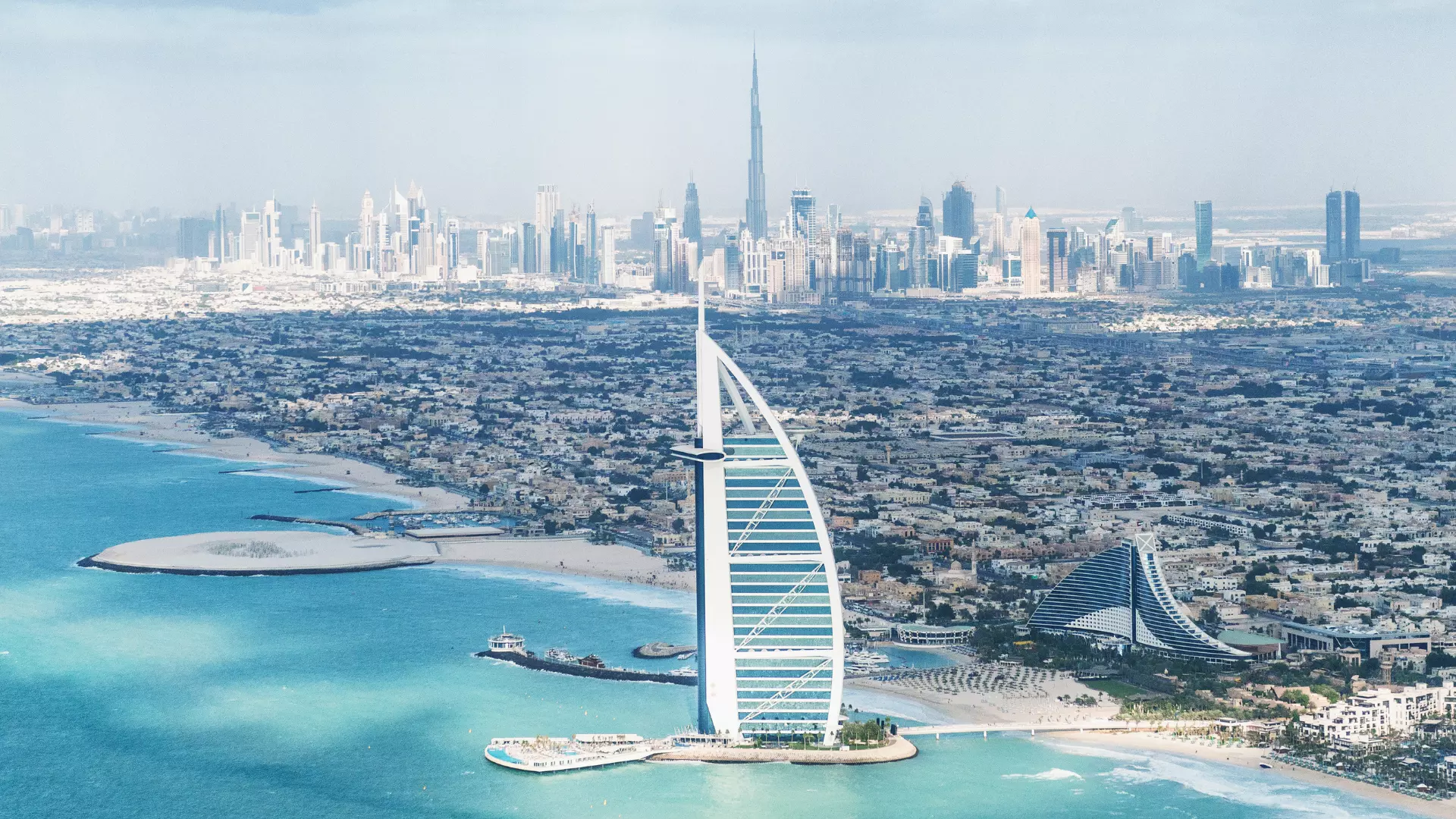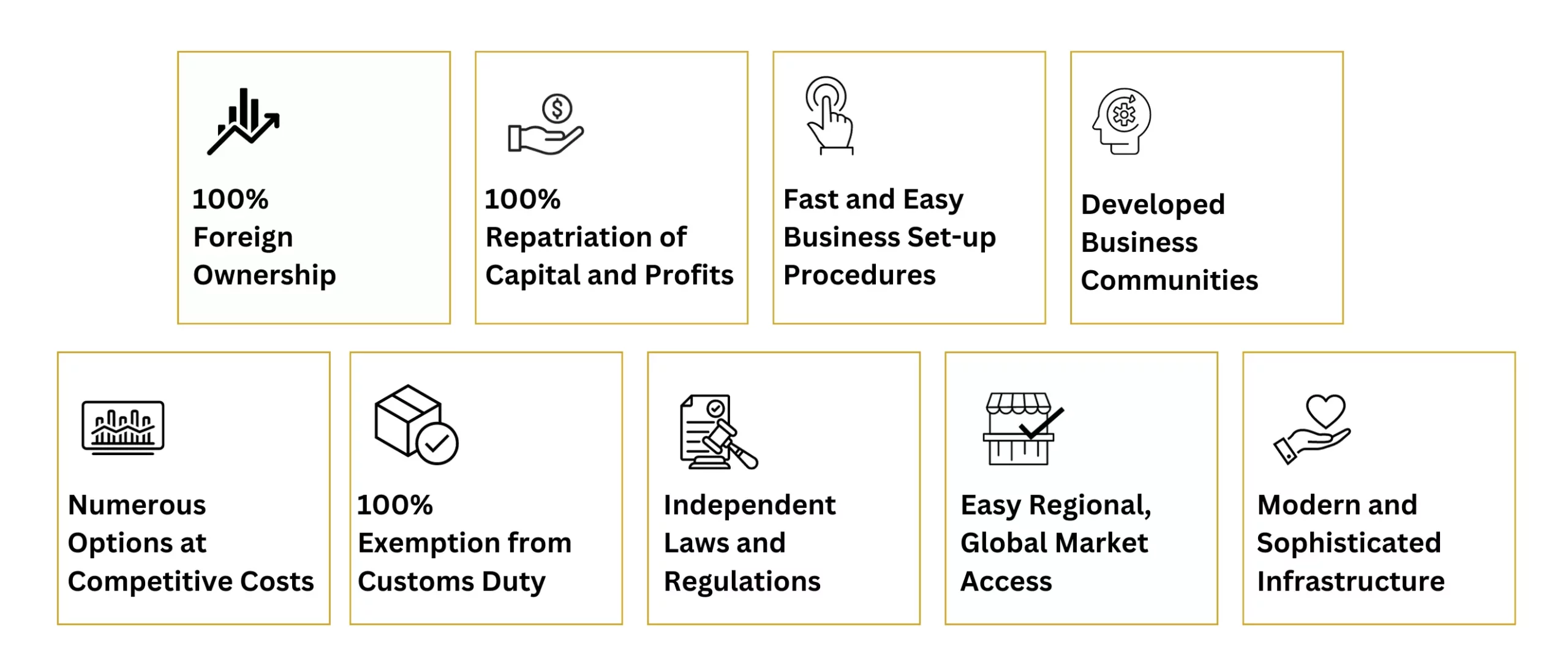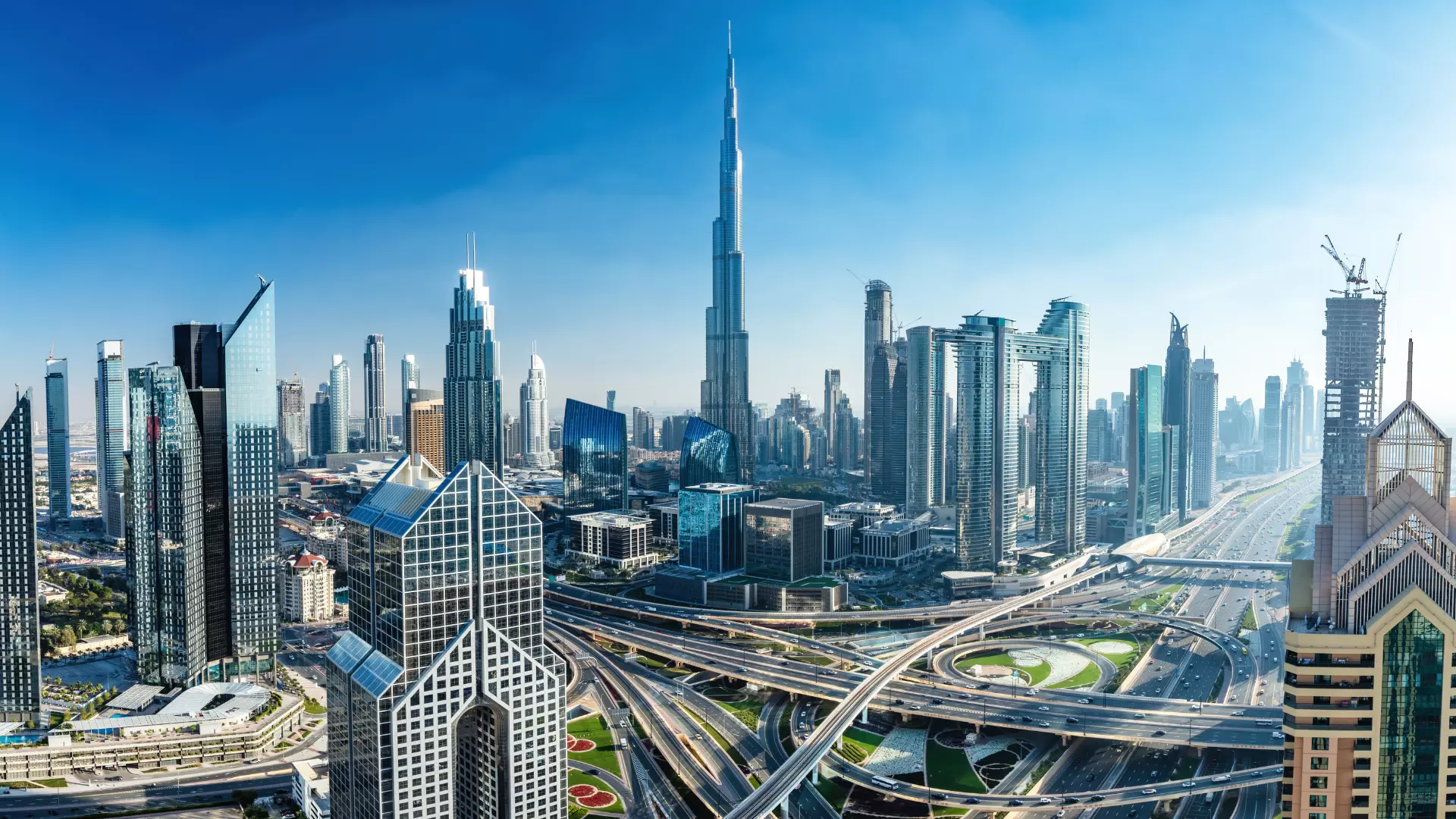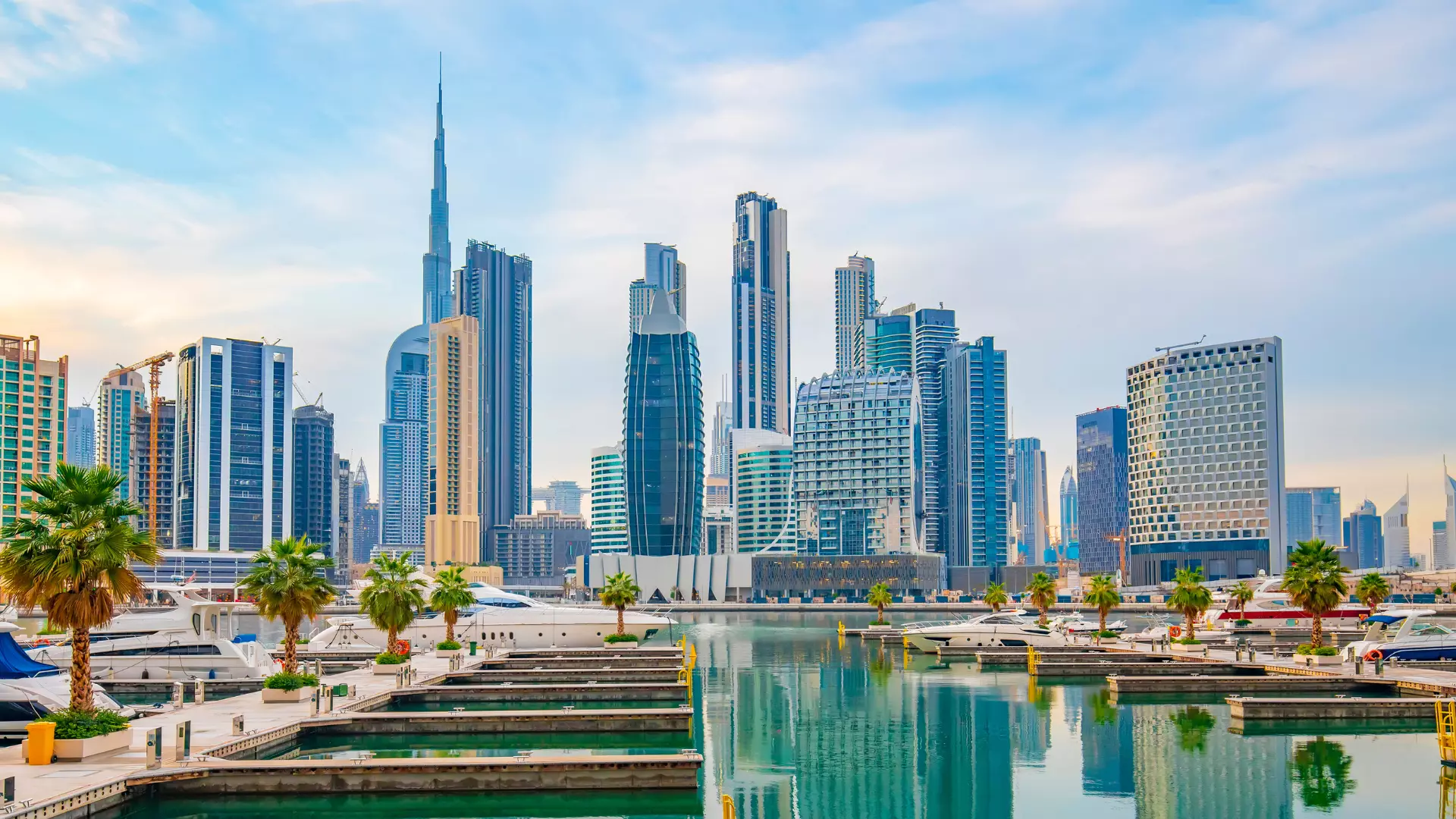Commercial License in Dubai: Requirements and Differences
Download
IFZA Official
Guides
-

Guide to obtaining a Dubai business license
Download the guide -

A UAE Business Owner’s Guide to Corporate Banking
Download the guide
Whether you’re starting fresh or thinking about expanding to the Middle East, keep reading to find out more about Dubai Free Zones and how they can boost your business goals
Jump To What Interests You the Most:
- What Is a Free Zone?
- Dubai Free Zones: Contributing to Global Recovery
- Geographic Distribution of Free Zones across the UAE
- Industry-Specific Dubai Free Zones
- What Makes UAE Free Zones Stand Out?
- Benefits of Dubai Free Zones
- Difference Between Dubai Free Zone and Mainland
- Types of Business Licenses Available in Dubai Free Zones
- What Kinds of Legal Entities Can Be Established in a Dubai Free Zone
- Business Setup Procedure in Dubai Free Zone
- What Are the Requirements for Initial Approval, Registration, Licensing, And Visa Processing in A Dubai Free Zone?
- Can Dubai Free Zone Companies Do Business on the Mainland?
- Dubai Free Zones: Challenges and Considerations
- Future Trends and Developments in Dubai Free Zones
- Dubai Free Zones FAQs
What Is a Free Zone?
The question “What is a Dubai Free Zone” may give you the indication that Free Zones are only found in this specific emirate, but Free Zones can be found throughout the UAE. The thing is Dubai’s popularity presents it as the prominent option for lucrative investment seekers.
A Free Zone, a free trade zone, or a Free Zone authority is an economic area ruled by its own specific regulations that do not apply to businesses outside the zone. Dubai Free Zone companies trade services and products, leveraging special tax and foreign ownership laws.
Establishing free trade zones was one of the initiatives the government took to diversify the economy and attract more foreign investors to Dubai and the UAE in general, allowing them to start a business within an evolving, entrepreneurial ecosystem and boost their profits.
The first Free Zone in the UAE is the Jebel Ali Free Zone, founded in 1985. Today, there are more than 40 Free Zones located in different parts of the UAE.
Want to learn more about Free Zones work? Read our blog here!
Dubai Free Zones: Contributing to Global Recovery
Since the development of the first Free Zone more than 60 years ago, the world has seen this model grow significantly in terms of number and size. Today, there are more than 7,000 Free Zones in more than 145 economies, employing more than 100 million.
According to the OECD, Free Zones are responsible for exports worth more than $3,500 billion a year representing 20 percent of the global trade of goods. This simply shows the importance of this sector and its contribution to the growth of the global economy.
Read more here.
Geographic Distribution of Free Zones across the UAE
Free zones are strategically distributed across all emirates in the UAE, offering businesses various options based on their specific preferences, industry focus, and other operational requirements. These geographical locations offer businesses the flexibility to choose a setting that aligns with their needs.
Here are some key considerations for each emirate:
Dubai:
Dubai is a major hub for business and commerce in the UAE. It hosts numerous free zones, each catering to different industries. These zones offer a range of benefits including industry-focused facilities, simplified business processes, and access to a global market.
Abu Dhabi:
As the capital of the UAE, Abu Dhabi also hosts several free zones. These free zones often have specific industry focuses and offer benefits tailored to those industries. Businesses looking to establish a presence in Abu Dhabi can benefit from its strategic location and business-friendly environment.
Sharjah:
Sharjah is another emirate with a variety of free zones. These zones cater to different sectors and offer incentives to attract businesses. The emirate’s connectivity and accessibility make it an appealing option for businesses looking to tap into the UAE market.
Businesses can choose a location based on factors such as proximity to key markets, industry clusters, logistical convenience, and the specific benefits offered by each emirate’s free zones.

Industry-Specific Dubai Free Zones
Dubai’s commitment to economic diversification and growth is exemplified by its establishment of industry-specific free zones. These zones are tailored to cater to the unique needs of various sectors, fostering specialization, innovation, and economic development.
Here are a few examples:
Technology and Innovation
These Dubai-free zones focus on nurturing technological advancement, research, and development. They provide state-of-the-art infrastructure, laboratories, and collaborative spaces to facilitate innovation. Startups and established tech companies alike benefit from a supportive environment, access to skilled professionals, and streamlined regulatory processes.
Media and Creative Industries
Media-oriented Dubai free zones are designed to support businesses in advertising, publishing, film production, broadcasting, and related fields. These zones offer specialized facilities and services that cater to the unique requirements of the media sector, including studio spaces, advanced equipment, and networking opportunities.
Healthcare and Medical Services
Dubai Free Zones specializing in healthcare provides a platform for medical institutions, clinics, research organizations, and pharmaceutical companies. These zones often aim to promote medical tourism and high-quality healthcare services. They offer advanced healthcare infrastructure, research facilities, and a regulatory framework conducive to the sector’s growth.
Logistics and Manufacturing
Logistics and manufacturing-focused Dubai free zones play a crucial role in promoting trade and industrial activities. These zones offer state-of-the-art facilities, warehousing, and logistical support, making them attractive to businesses engaged in import, export, and manufacturing operations.
Financial Services
Some Dubai free zones are dedicated to financial services such as banking, insurance, and investment. These zones provide a favorable regulatory environment for financial institutions and offer services that facilitate international business transactions.
Education and Research
Education-focused Dubai free zones are designed to provide a platform for institutions offering academic and research programs. These zones support knowledge exchange, research collaboration, and the development of educational initiatives.
Each industry-specific Dubai free zone is carefully designed to cater to the unique needs and demands of its respective sectors. This targeted approach contributes to the overall economic diversification and growth of the UAE.
What Makes UAE Free Zones Stand Out?
Free Zones in the UAE, especially in Dubai, operate under separate legislation compared to the mainland businesses. Each Free Zone is supervised by its own authority, with around 45 such zones currently operational in the UAE. These zones offer numerous incentives for investors, making them lucrative for businesses in various sectors like healthcare, trading, tech, and more.
Benefits of Dubai Free Zones
The UAE is a land of opportunities, and Dubai Free Zones are a big part of what makes it a great place to do business.
By investing in Dubai Free Zones, you can enjoy many benefits such as:

If you are looking to set up your business in a Dubai Free Zone, here are some of the attractive benefits:
- 100% foreign ownership
- 100% repatriation of capital and profits
- Tax exemptions
- 100% free transfer of funds, and no foreign exchange controls
- Flexibility to operate 24/7
- A variety of commercial offices available for sale or lease
- Easy start-up and licensing procedures
- Unique industry clustering and purpose-built infrastructure.
- Exemption from all import and export duties
- Low freight charges
- Multicultural workforce and easy recruitment procedures
- The timely and streamlined immigration process.
Read blog here
Difference Between Dubai Free Zone and Mainland
- Ownership:
While most Mainland companies may only have a maximum foreign ownership of 49%, Dubai Free Zones offers complete foreign ownership from the start.
- Business Scope:
Dubai Free Zone Companies are restricted to conducting business only within the Free Zone, while Mainland companies can operate throughout the UAE.
- Workspace:
Mainland companies must have a physical office of at least 200 square feet, while virtual workplaces are allowed for some Dubai Free Zone companies.
- Visas:
The number of visas a Mainland company can obtain depends on the size of its workspace, while the number of visas available to Dubai Free Zone companies is determined by specific regulations of the relevant authority.
- Business Setup Approvals:
The establishment of a Mainland company requires clearance from various government agencies, while each Dubai Free Zone has its own laws and regulations for its registered businesses.
Types of Business Licenses Available in Dubai Free Zones
Dubai Free Zones offers a diverse range of business licenses tailored to various industries and professional endeavors. Here are some of the most popular ones:
Industrial License
An industrial license within Dubai Free Zones is required for businesses involved in the production of goods and products, including the manufacture of machinery, chemicals, and food products.
Professional License
The Dubai Free Zone professional license is needed for businesses that offer professional services such as consulting, accounting, and legal services. This type of license is also required for businesses involved in creative industries such as graphic design, architecture, and advertising.
Freelance Permit
Dubai Free Zones pave the way for individual freelancers to shine independently. This license is designed for individuals who want to work as freelancers in Dubai. It allows you to offer your professional services as an independent contractor, rather than as an employee of a company
E-Commerce License
This license is needed for businesses involved in online trading and e-commerce activities. Tailored for Dubai Free Zones, it is important to note that this license only allows the online sale of goods.
Tourism License
This license is required for businesses involved in the tourism sector such as hotels, tour operators, and travel agencies.
Commercial License
This license is for businesses involved in trading activities such as wholesale and retail trade, import and export, and storage and distribution.
Learn more about the different types of business licenses in Dubai Free Zones here.

What Kinds of Legal Entities Can Be Established in a Dubai Free Zone
There are two types of legal entities that can be established in a Dubai Free Zone. These are:
Free Zone Company (FZCO)
A Dubai Free Zone Company (FZCO) shares similarities with a Free ZoneLimited Liability Company (FZ LLC), but with a notable distinction – it can accommodate more than 50 shareholders. This feature makes it an appealing choice for businesses with broader ownership participation. A Free Zone Company (FZCO) operates within the framework of Free Zone regulations, offering a level of autonomy while enjoying the benefits of operating within the Free Zone environment.
An essential requirement for establishing a Free Zone Company (FZCO) is the appointment of a minimum of one director and a secretary. This structure fosters a degree of corporate governance and administrative oversight, aligning with international business practices. By allowing for increased shareholder participation, a Free Zone Company (FZCO) can facilitate diverse investment scenarios, collaborations, and expansion strategies.
Free Zone Establishment (FZE)
A Free Zone Establishment (FZE) is designed for those seeking a simplified ownership structure, where the company is owned by a single shareholder. This shareholder can be an individual or a corporate entity. The Free Zone Establishment (FZE) structure provides a direct and straightforward ownership model, ensuring that the shareholder has full responsibility for the company’s operations and liabilities.
This one-shareholder approach streamlines decision-making processes, as there’s a clear and singular ownership perspective. It is often chosen by sole proprietors, entrepreneurs, and small businesses seeking a simplified setup that enables them to maintain direct control over their operations while benefitting from the Free Zone’s supportive infrastructure.
The type of legal entity that is right for you will depend on the size and structure of your business, as well as your personal preferences.
Business Setup Procedure in Dubai Free Zone
Setting up a business in Dubai may seem like an overwhelming task. Here is a breakdown of the steps involved:
- Determine the Business Entity Type:
Begin by choosing your business activities and type of legal entity.
- Choose A Trading Name:
Your business name should comply with the criteria set out by the UAE government.
- Apply For a Business License:
Depending on the Free Zone jurisdiction that you will choose and/or your business activity, you may need to attach a copy of a business plan along with your license application.
- Choose An Office Space:
Dubai Free Zones offer various office solutions such as a flexi-desk to support start-ups.
- Get Pre-Approvals, Register Your Business, And Get Your License.
This should take a few weeks, once you have your license you are free to start your business.
- Open Your Corporate Bank Account:
You would need a bank account to commence your business in Dubai.
Want to learn more about the business setup process in Dubai Free Zones? Click here!
What Are the Requirements for Initial Approval, Registration, Licensing, And Visa Processing in A Dubai Free Zone?
The requirements for initial approval, registration, licensing, and visa processing can vary depending on the Free Zone authority and the type of business activity. Generally, the required documents include a completed application form, colored passport copies of the company’s shareholders and appointed manager or director, and if the applicants are inside the UAE, copies of their Emirates ID and UAE Residence Visa. Other Dubai Free Zones may require you to submit a business plan, financial reports, letters of intent, and other documents. For freelancers, additional documents such as a curriculum vitae (CV) may be required.
Once initial approval is granted, the Dubai Free Zone authority will prepare the lease agreement, issue the trade license, and begin the visa processing for the company’s employees. It’s important to note that each Free Zone has its own set of rules, so it’s essential to check with the relevant Free Zone authority for specific requirements.
Can Dubai Free Zone Companies Do Business on the Mainland?
Yes, come Dubai Free Zone companies can conduct business activities in the Dubai mainland; however, this requires obtaining appropriate approvals from the respective Free Zone authorities.
It’s important to remember that many Dubai Free Zones limit their activities to international trade or interactions with entities within the same Free Zone.
In instances where Free Zone businesses aim to establish a presence in the Dubai mainland, several approaches can be considered:
- Engaging a mainland logistics partner to handle intra-UAE movement of goods.
- E-commerce companies in Free Zones can utilize courier or delivery services for distributing products within the UAE.
- Creating a branch of the Free Zone-based business on the Dubai mainland, which should share identical activities and names with the original Free Zone entity.
If you want to trade between your Dubai Free Zone company and the mainland, the appropriate course of action involves interacting with the Dubai Department of Economy and Tourism (DET).
This necessitates applying, along with the associated fees. If your business operates within a Free Zone, we can offer guidance regarding the most suitable approach for your company to engage in business with Dubai mainland.

Dubai Free Zones: Challenges and Considerations
- Initial Setup Costs:
Setting up a business in a Dubai free zone involves various costs, including company registration fees, licensing fees, office space rentals, visa fees, and other administrative expenses. While free zones offer attractive incentives, businesses need to carefully consider and plan for these upfront costs. Conducting a thorough cost analysis is essential to avoid unexpected financial strain during the initial phases of establishment.
- Compliance with Regulations:
While Dubai free zones offer regulatory advantages, businesses are still required to adhere to specific rules and regulations set by the respective free zone authorities and relevant government bodies. Navigating these regulations can be complex, and non-compliance can result in penalties or even the revocation of licenses.
- Competition and Saturation:
As Dubai free zone attract businesses from diverse sectors, competition within these zones can be intense. Businesses need to differentiate themselves and develop a unique value proposition to stand out. Additionally, in some popular industry-focused free zones, the market may become saturated with similar businesses, making it crucial to carefully assess market demand and potential saturation risks.
- Limited Physical Presence Requirements:
While some Dubai free zones like IFZA offer virtual setups or flexi-desk options, others may require businesses to maintain physical office space. This can add to the operational costs, especially for businesses that do not require a large physical presence. Finding a balance between cost efficiency and meeting the free zone’s requirements is essential.
Read more about various office space types here.
- Future Flexibility and Expansion:
Businesses should consider their long-term growth plans when choosing a free zone. While some Dubai free zones offer opportunities for expansion and scalability within the same zone or into mainland operations, others might have limitations on certain activities or sectors. It’s important to choose a Dubai free zone that aligns with your growth strategy and allows for future flexibility.
Here are 5 common business setup challenges and effective solutions! Read now.
Future Trends and Developments in Dubai Free Zones
- Impact of Technological Advancements:
Artificial intelligence (AI), blockchain, and other emerging technologies are likely to transform various aspects of business operations within Dubai free zones. This could lead to increased efficiency in processes such as licensing, customs clearance, and administrative tasks. Additionally, technology-driven innovations might attract more digital businesses to these zones, further solidifying the UAE’s position as a technology hub.
- Evolving Regulations and Policies
As global business dynamics change, regulations and policies governing free zones are expected to evolve. Governments might introduce new incentives to attract specific industries or modify existing regulations to align with international standards. These changes could affect areas such as taxation, intellectual property protection, and ease of doing business. Staying updated with regulatory changes will be crucial for businesses operating within free zones to ensure ongoing compliance and to take advantage of new opportunities.
- Sustainability Initiatives in Dubai Free Zones
With an increasing focus on environmental responsibility and sustainability, Dubai free zones are likely to incorporate green and sustainable practices. This includes the adoption of renewable energy sources, development of eco-friendly infrastructure, and implementation of waste reduction measures. As sustainability becomes a global priority, businesses operating within environmentally conscious free zones could benefit from enhanced reputations and appeal to eco-conscious consumers.
- Digital Transformation and E-commerce:
As e-commerce continues to grow, Dubai free zones may adapt to support businesses engaged in online retail and logistics. This could involve specialized facilities, streamlined customs procedures for cross-border e-commerce, and digital infrastructure that supports online businesses.
Learn how you can get an ecommerce license here.
- Enhanced Cross-Border Trade:
With the UAE’s strategic location as a global trade hub, Dubai free zones could play an even more significant role in facilitating cross-border trade and global supply chains. The integration of digital technologies, such as blockchain for supply chain management, could streamline international trade processes within these zones.
- Fintech and Financial Services:
The growth of the fintech industry might lead to the establishment of Dubai free zones specifically tailored for financial technology companies. These zones could offer regulatory sandboxes, innovative regulatory frameworks, and specialized support for fintech startups and companies.
Businesses that stay attuned to these trends and adapt their strategies accordingly will be well-positioned to leverage the opportunities presented by the evolving landscape of free zones in the UAE
Dubai Free Zones FAQs
Can I open a UAE Bank Account with my Free Zone Company?
Yes, you can and there is a wide variety of good banks to choose from.
Do I need to be a UAE Resident if I have a Free Zone Company?
No, you are not required to be a resident or to live in the UAE if you own a Free Zone Company. Learn more about setting up your business in a dynamic Dubai Free Zone like IFZA here.
Will I be able to trade inside and outside UAE with my Freezone Company?
Yes, you can trade locally and internationally but subject to the Rules and Regulations of the Free Zone.





